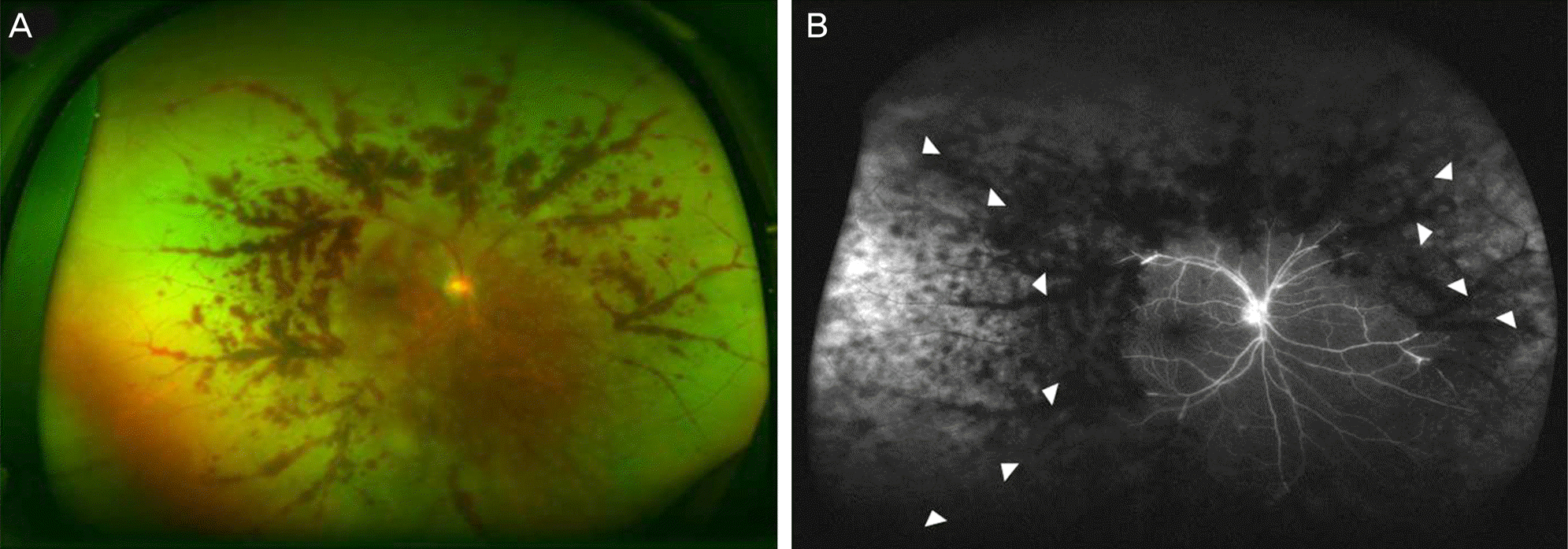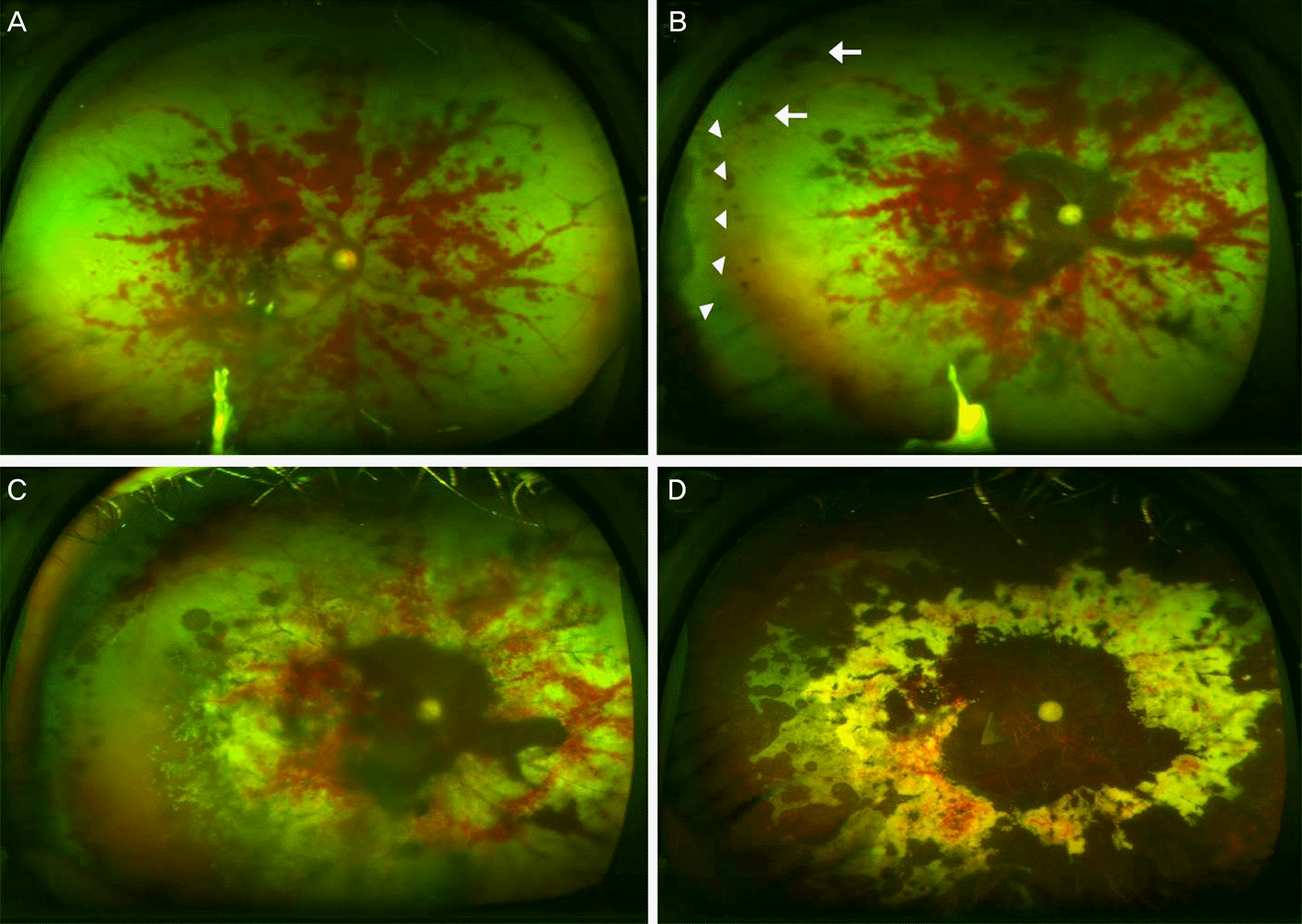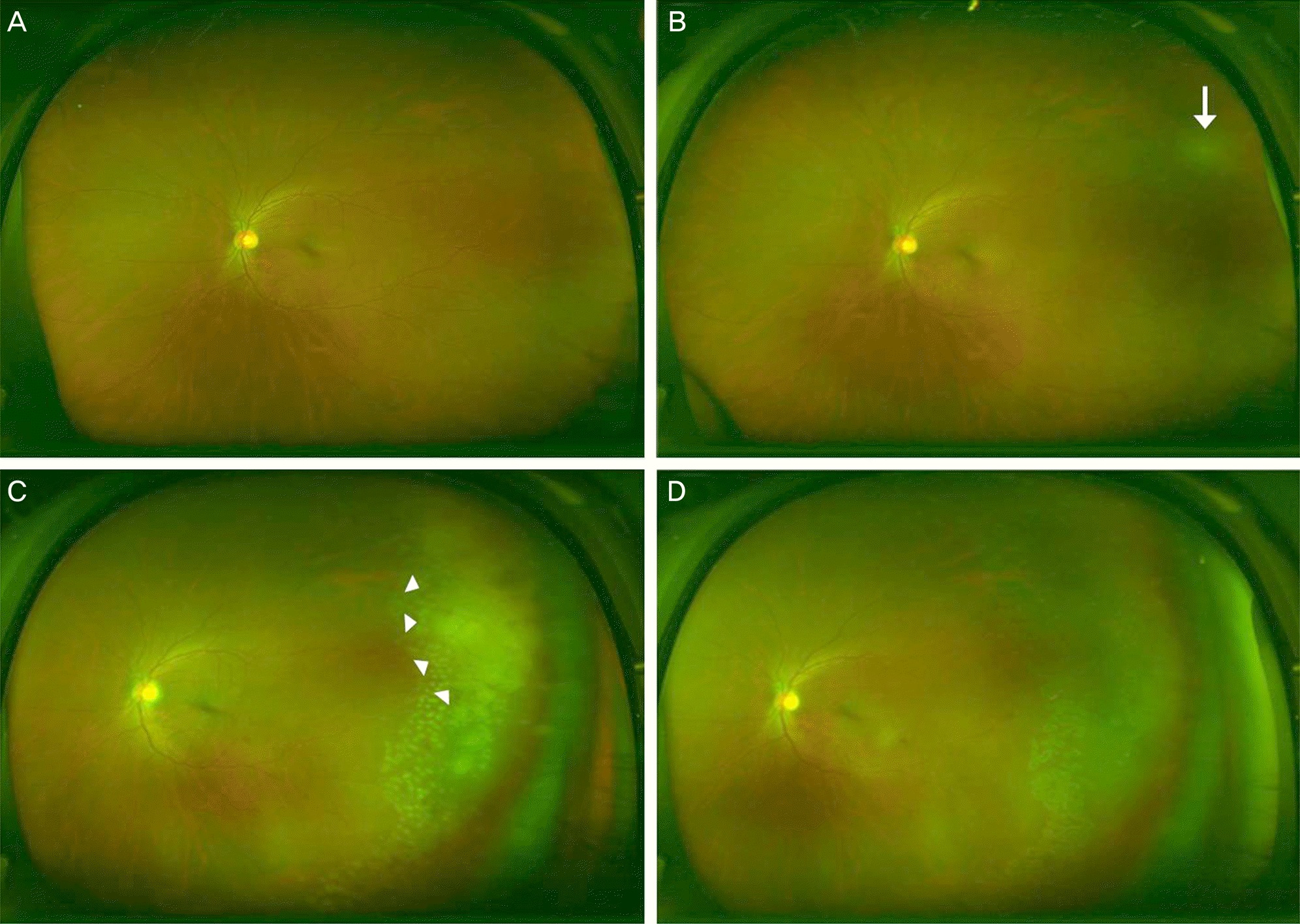초록
Purpose:
To report a case of atypical acute retinal necrosis (ARN) observed using ultra-wide-field imaging.
Case summary:
A 50-year-old male with recurrent oral ulcer presented with visual loss in his right eye. On the initial visit, slit-lamp examination showed inflammatory cells (3+) in the anterior chamber and vitreous of the right eye. Funduscopic examination and ultra-wide-field fundus images showed severe occlusive vasculitis with perivascular hemorrhage. No necrotic lesion was observed at the peripheral retina in the left eye. Under the impression of Behçet's uveitis, immunosuppressive therapies including oral steroid, intravenous cyclophosphamide, anti-tumor necrosis factor (TNF) alpha agent and intravitreal triamcinolone were administered, but without improvement. Subsequently, a necrotic lesion appeared at the far peripheral retina in the right eye and varicella-zoster virus was identified using the polymerase chain reaction test. After the patient was diagnosed with atypical ARN, intravenous acyclovir was administered, resulting in eventual suppression of the necrotic lesion progression. Due to retinal detachment, pars plana vitrectomy with silicone oil infusion was performed in the right eye. At that time, a whitish lesion at the far peripheral retina in the ultra-wide-field photography of the fellow eye was found and 3 intravitreal ganciclovir injections were administered. Finally, the whitish lesion regressed after 1 month.
References
1. Urayama A, Yamada N, Sasaki T, et al. Unilateral acute uveitis with retinal periarteritis and detachment. Jpn J Clin Ophthalmol. 1971; 25:607–19.
2. Usui Y, Goto H. Overview and diagnosis of acute retinal necrosis syndrome. Semin Ophthalmol. 2008; 23:275–83.

3. Walters G, James TE. Viral causes of the acute retinal necrosis syndrome. Curr Opin Ophthalmol. 2001; 12:191–5.

4. Tugal-Tutkun I, Gupta V, Cunningham ET. Differential diagnosis of behçet uveitis. Ocul Immunol Inflamm. 2013; 21:337–50.

5. Wessel MM, Aaker GD, Parlitsis G, et al. Ultra-wide-field angiography improves the detection and classification of diabetic retinopathy. Retina. 2012; 32:785–91.

6. Prasad PS, Oliver SC, Coffee RE, et al. Ultra wide-field angio-graphic characteristics of branch retinal and hemicentral retinal vein occlusion. Ophthalmology. 2010; 117:780–4.

7. Tsui I, Kaines A, Havunjian MA, et al. Ischemic index and neovascularization in central retinal vein occlusion. Retina. 2011; 31:105–10.

8. Kaines A, Tsui I, Sarraf D, Schwartz S. The use of ultra wide field fluorescein angiography in evaluation and management of uveitis. Semin Ophthalmol. 2009; 24:19–24.

9. Anderson L, Friberg TR, Singh J. Ultrawide-angle retinal imaging and retinal detachment. Semin Ophthalmol. 2007; 22:43–7.

10. Clarkson JG, Blumenkranz MS, Culbertson WW, et al. Retinal detachment following the acute retinal necrosis syndrome. Ophthalmology. 1984; 91:1665–8.

11. Holland GN. Standard diagnostic criteria for the acute retinal necrosis syndrome. Executive Committee of the American Uveitis Society. Am J Ophthalmol. 1994; 117:663–7.
12. Neubauer AS, Yu A, Haritoglou C, Ulbig MW. Peripheral retinal changes in acute retinal necrosis imaged by ultra widefield scanning laser ophthalmoscopy. Acta Ophthalmol Scand. 2005; 83:758–60.

13. Wensing B, de Groot-Mijnes JD, Rothova A. Necrotizing and nonnecrotizing variants of herpetic uveitis with posterior segment involvement. Arch Ophthalmol. 2011; 129:403–8.

14. Khairallah M, Accorinti M, Muccioli C, et al. Epidemiology of Behçet disease. Ocul Immunol Inflamm. 2012; 20:324–35.

15. Park JW, Koh HJ, Kim HB. Behcet's Disease in Korean. J Korean Ophthalmol Soc. 2002; 43:67–74.
16. Bodaghi B, Rozenberg F, Cassoux N, et al. Nonnecrotizing herpetic retinopathies masquerading as severe posterior uveitis. Ophthalmology. 2003; 110:1737–43.

Figure 1.
(A) Wide-field fundus photography of the right eye at the initial visit. Severe perivascular hemorrhages without peripheral necrotic lesion are noted. (B) Fluorescein angiography shows diffuse arteriolar and venular occlusions at the initial visit. Hyperfluorescence is observed at the nasal and temporal area (white arrow heads).

Figure 2.
The progress of atypical acute retinal necrosis of the right eye. (A) On day 10, perivascular hemorrhage progressed to the optic disc. (B) On day 17, peripheral retinal necrotic lesion (white arrow heads) accompanied by retinal hemorrhage (white arrows) was first observed. Then, intravitreal acyclovir 1,000 mg (13 mg/kg) was started. (C) On the eighth day of acyclovir treatment, retinal detachment developed at the temporal area. (D) One month after vitrectomy and silicone oil infusion, the retina was well attached and remnant yellowish necrotic lesion slightly regressed.

Figure 3.
Wide-field fundus photography of the left eye. (A) No remarkable lesion is found at the initial visit. (B) On day 17, whitish lesion newly appeared at 1 o’clock area in the left eye (white arrow). (C) Four days after intravitreal ganciclovir injection (2 mg/0.05 mL) and barrier laser, whitish lesion is enlarged and progressed to posterior pole (white arrow heads). Two additional intravitreal ganciclovir injections were done. (D) One month later, whitish lesion almost regressed.





 PDF
PDF ePub
ePub Citation
Citation Print
Print


 XML Download
XML Download